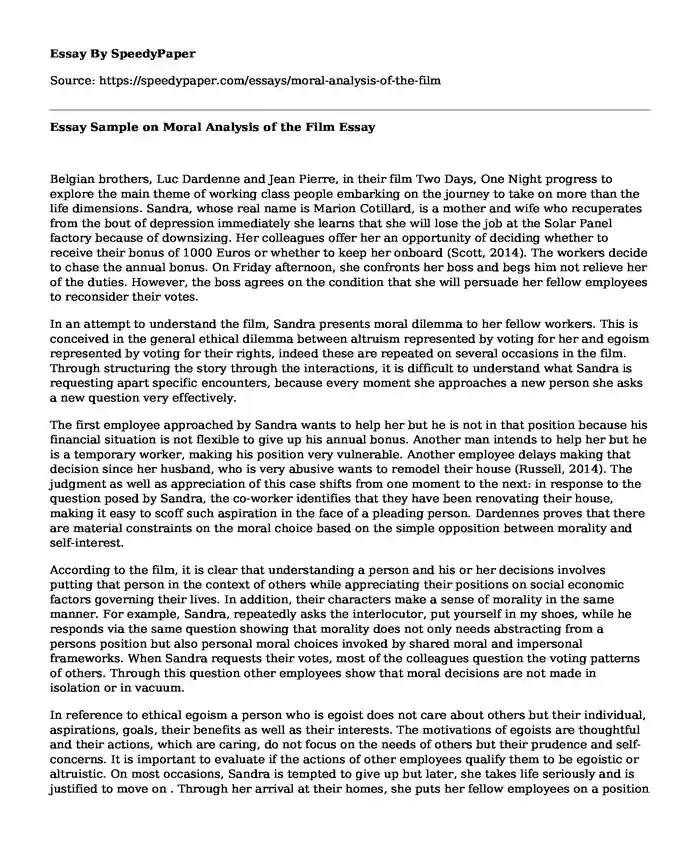Belgian brothers, Luc Dardenne and Jean Pierre, in their film Two Days, One Night progress to explore the main theme of working class people embarking on the journey to take on more than the life dimensions. Sandra, whose real name is Marion Cotillard, is a mother and wife who recuperates from the bout of depression immediately she learns that she will lose the job at the Solar Panel factory because of downsizing. Her colleagues offer her an opportunity of deciding whether to receive their bonus of 1000 Euros or whether to keep her onboard (Scott, 2014). The workers decide to chase the annual bonus. On Friday afternoon, she confronts her boss and begs him not relieve her of the duties. However, the boss agrees on the condition that she will persuade her fellow employees to reconsider their votes.
In an attempt to understand the film, Sandra presents moral dilemma to her fellow workers. This is conceived in the general ethical dilemma between altruism represented by voting for her and egoism represented by voting for their rights, indeed these are repeated on several occasions in the film. Through structuring the story through the interactions, it is difficult to understand what Sandra is requesting apart specific encounters, because every moment she approaches a new person she asks a new question very effectively.
The first employee approached by Sandra wants to help her but he is not in that position because his financial situation is not flexible to give up his annual bonus. Another man intends to help her but he is a temporary worker, making his position very vulnerable. Another employee delays making that decision since her husband, who is very abusive wants to remodel their house (Russell, 2014). The judgment as well as appreciation of this case shifts from one moment to the next: in response to the question posed by Sandra, the co-worker identifies that they have been renovating their house, making it easy to scoff such aspiration in the face of a pleading person. Dardennes proves that there are material constraints on the moral choice based on the simple opposition between morality and self-interest.
According to the film, it is clear that understanding a person and his or her decisions involves putting that person in the context of others while appreciating their positions on social economic factors governing their lives. In addition, their characters make a sense of morality in the same manner. For example, Sandra, repeatedly asks the interlocutor, put yourself in my shoes, while he responds via the same question showing that morality does not only needs abstracting from a persons position but also personal moral choices invoked by shared moral and impersonal frameworks. When Sandra requests their votes, most of the colleagues question the voting patterns of others. Through this question other employees show that moral decisions are not made in isolation or in vacuum.
In reference to ethical egoism a person who is egoist does not care about others but their individual, aspirations, goals, their benefits as well as their interests. The motivations of egoists are thoughtful and their actions, which are caring, do not focus on the needs of others but their prudence and self-concerns. It is important to evaluate if the actions of other employees qualify them to be egoistic or altruistic. On most occasions, Sandra is tempted to give up but later, she takes life seriously and is justified to move on . Through her arrival at their homes, she puts her fellow employees on a position of revealing the source of precocity as well as vulnerabilities that trouble their lives. It is not the employees who choose their bonuses show their moral ambiguity but those who make a choice of helping her.
Theodor Adorno, a German philosopher once stated that wrong lives cannot be lived rightly (Russell, 2014). Through this statement, he meant that in this period of advanced international capitalism where the lives depend on political and economic systems, the idea of private morality enacted by the choice of each person is incoherent if human effort is reabsorbed by inhumane system, then individual aspirations are right. According to the altruists, moral actions focus on sacrificing personal desires for the sake of other people. However, in reality, personal goals and aspirations come before the needs of other people, especially in situations that are unavoidable. Since, there is no moral transaction between people, their judgement through their votes is morally justified and even if private morality is called for, it cannot give a moment of comfort and respite.
References
Russell, F. (2014). Repetition and Difference: Two Days, One Night. Retrieved from https://lareviewofbooks.org/article/repetition-difference-two-days-one-night/#!
Scott, A. O. (2014). Whats More Important: My Job or Your Bonus? Retrieved from http://www.nytimes.com/2014/12/24/movies/two-days-one-night-from-jean-pierre-and-luc-dardenne.html?_r=0
Cite this page
Essay Sample on Moral Analysis of the Film. (2019, Oct 08). Retrieved from https://speedypaper.net/essays/moral-analysis-of-the-film
Request Removal
If you are the original author of this essay and no longer wish to have it published on the SpeedyPaper website, please click below to request its removal:
- Education Essay Sample: My Techniques to Making Myself Study
- IT Essay Example: Wireless Service Technologies in Internet America
- Essay Sample: Offender Incarceration in America (Punitive vs. Rehabilitative Approach)
- Essay Sample About Human Trafficking
- Essay Sample: The Conditions in Detention Centers at the United States Border
- Essay Example: Trend Analysis of the National Center for Education Statistics
- Essay Sample on Effects of Parental Involvement on Children With Disabilities
Popular categories





